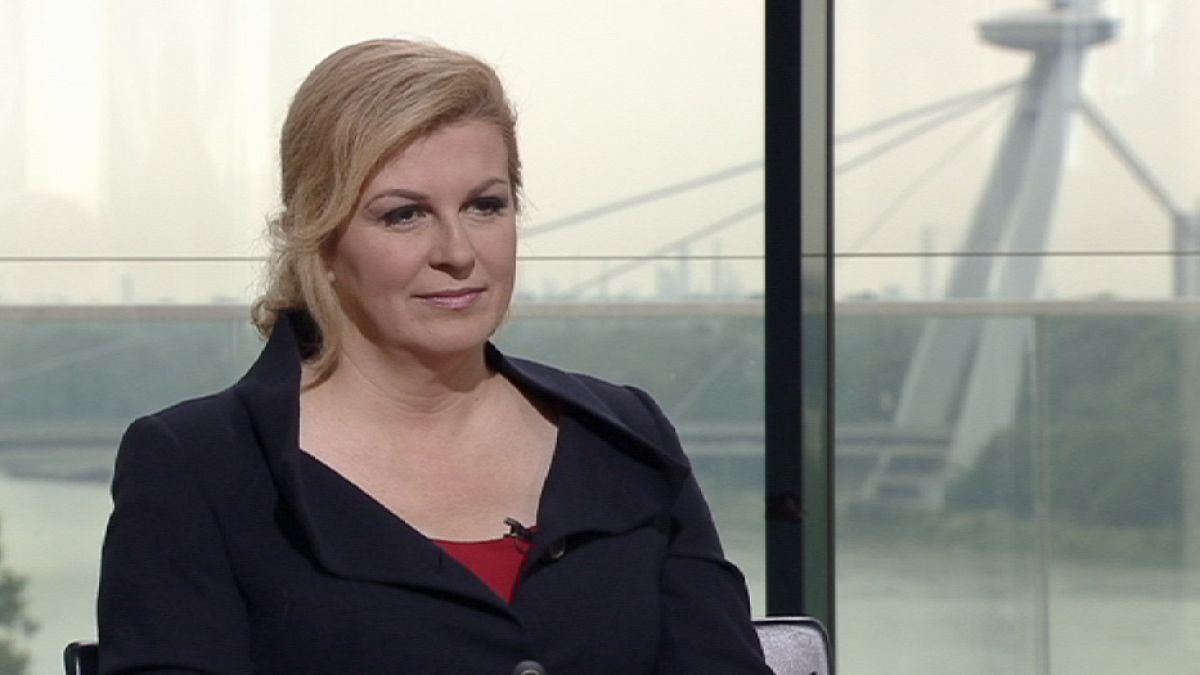The Croatian President has a clear vision for her country and Balkan region - she discussed peace, the economy, corruption and being the first female president in her country.
Kolinda Grabar-Kitarovic was elected President of Croatia this January, winning by the narrowest of margins. Though her post is largely ceremonial she has a clear vision for her country and the Balkans which she shared with Euronews journalist Isabelle Kumar.
It’s 20 years since the Dayton Peace Accords were signed, yet the spectre of intra-ethnic violence still casts its shadow over the region. The president laid some of the blame on the EU and NATO but also recognised that several of the EU hopefuls had not kept up with the necessary reforms process.
- Kolinda Grabar-Kitarović is the first female president of Croatia
- She was elected President of Croatia in January 2015
- She won by a very narrow margin garnering 50.7 % of the vote
- In Croatia, the presidency is a largely ceremonial post, with some say on foreign policy and defense
- Kitarović was formerly foreign minister and also a senior Nato official
The EU and Nato need to send firm messages to the region
“The European Union and NATO have to send very firm messages to the region. First of all, that enlargement remains as a policy, that the door remains open. That it is not a moving or an elusive target but that proper work and efforts fulfilling criteria for membership and carrying out the necessary reforms, the progress that you make at home will be rewarded by appropriate steps on the way to EU and NATO membership.”
Croatia joined the European Union two years ago but for Grabar-Kitarovic many of her Balkan neighbours still have a lot of catching up to do: “I would like to see more effort on preventing organised crime, co-operation on matters of security, but also a more vigorous fight against corruption, media freedoms, democratic systems, control of the intelligence sector, and the proper usage of the intelligence sector in accordance with the law.”
She had strong words for the Former Yugoslav Republic of Macedonia that has plunged into political crisis after the government was accused of wide-ranging corruption. For Grabar-Kitarovic the problem was no longer an issue of the name dispute with Greece:
“The sooner they put more effort into really looking at those media freedoms, and the independence of the judiciary and many other reforms and continue vigorously in opening up, the more progress they will be making. It really is up to them.”
But despite Croatia’s accession she was unsure whether her country was better off as a member of the EU: “It’s hard to judge, I have to say it has not settled in peoples’ heads that we are a member of the European Union. And unfortunately what has not happened yet, is that we have not used the EU funding to the extent that we could have. So one of the primary benefits that can be felt in the short term has not yet affected Croatia. I would say that the public in Croatia is probably becoming more Eurosceptic, and we need to do something about it. We should be worried about the whole European project it’s not just about Croatia.”
However, she did express her will to continue on the path of further integration by joining the eurozone:
“I think it would be in our interest to join the eurozone and as soon as possible. Yes, I hope it will be ready by 2020 but you know it’s not just a technical process it’s often-times a political process as well so it will depend on some political decisions as well. The whole economy is so euro-orientated that I think the sooner we join, the better it will be for the whole economy.”
On a more sensitive note, Grabar-Kitarovic was quick to distance herself from former Prime Minister Ivo Sanader who has been convicted of corruption. She took exception to being described as his protégé.
“I don’t like that word, I am sorry, I was not a protégé.”
Finally when asked what it was like to be the country’s first female president, Grabar Kitarovic said sometimes she had had to work harder than men, had been subject to misogyny but that her battle was one for equality not just for women.
“I am not a feminist. I am a person who just wants to see equality, equal treatment for everyone. So yes, I will push for the agenda of promoting women in business, and in political and social life, in public life, but it does not mean that I want women to be advantaged in any way, I just want equal opportunities for everyone.”
